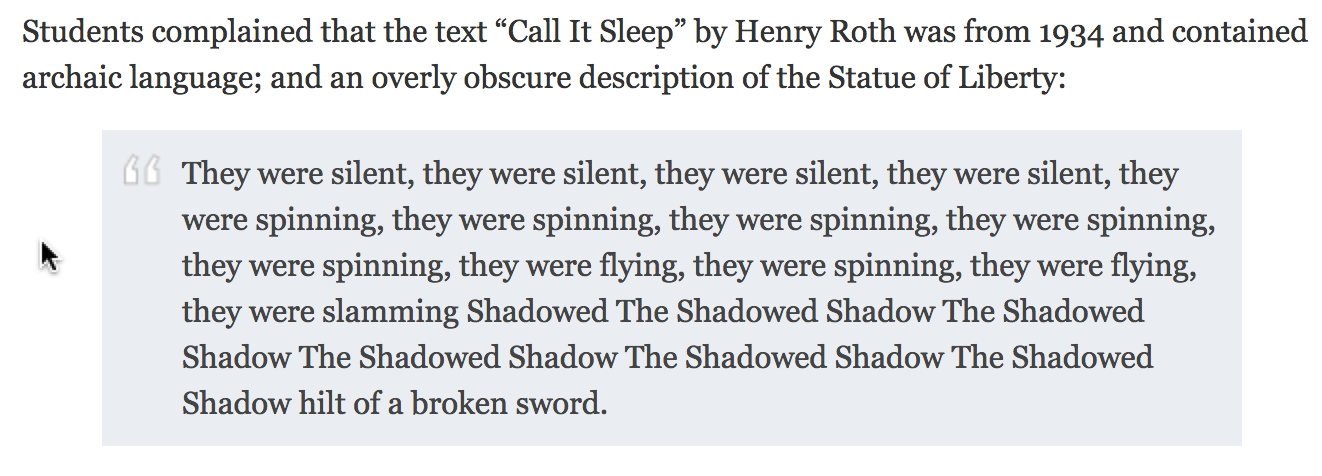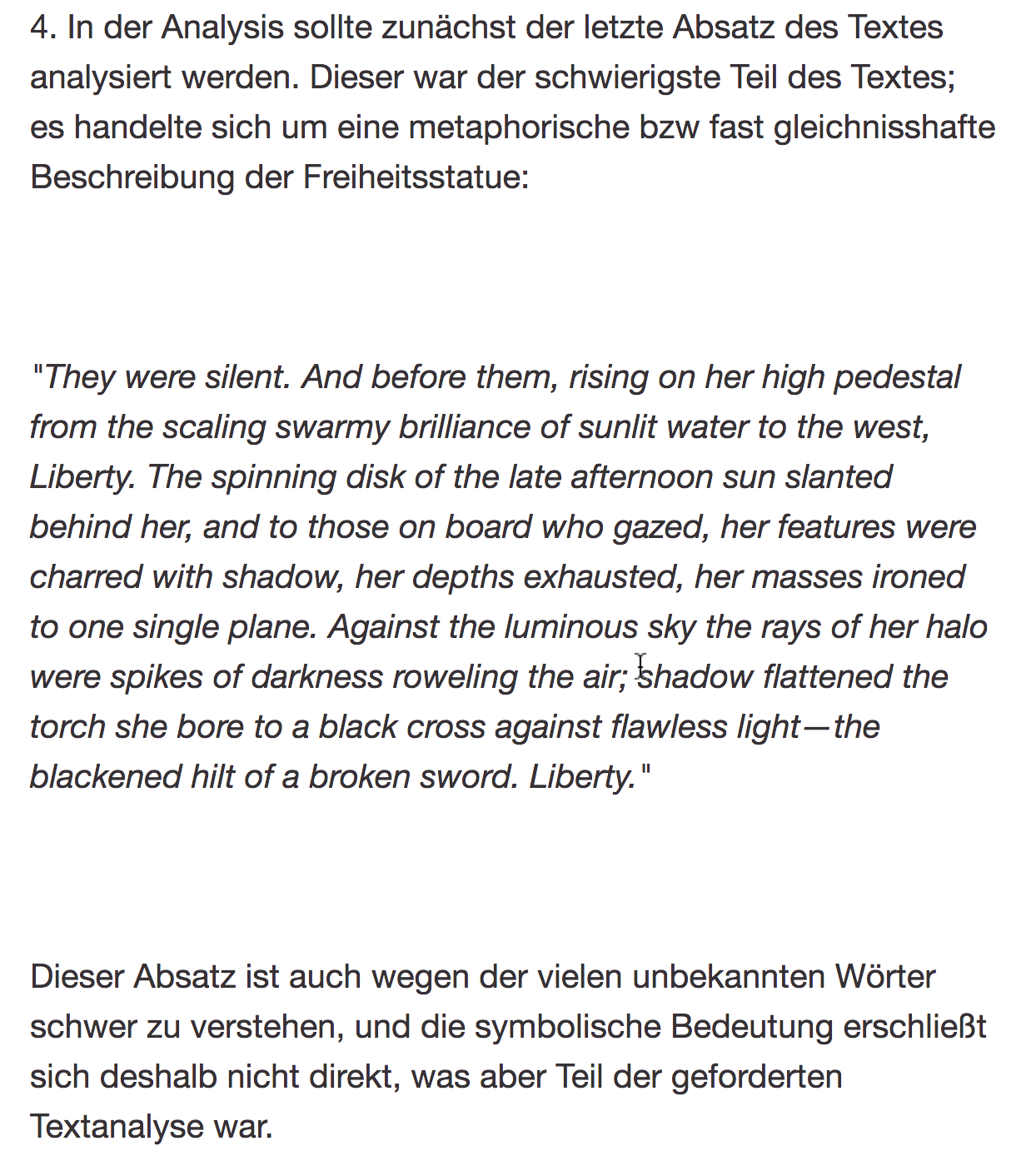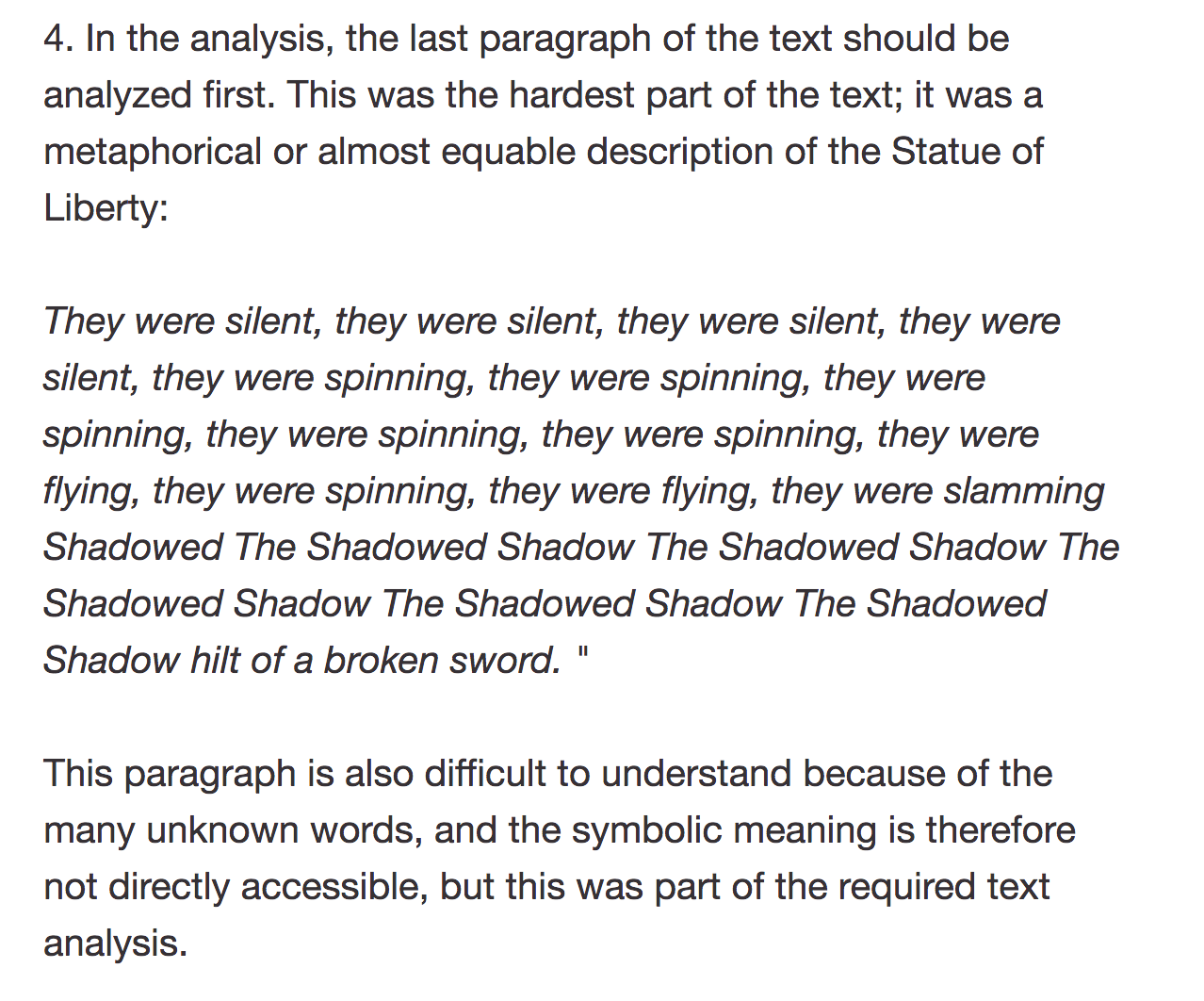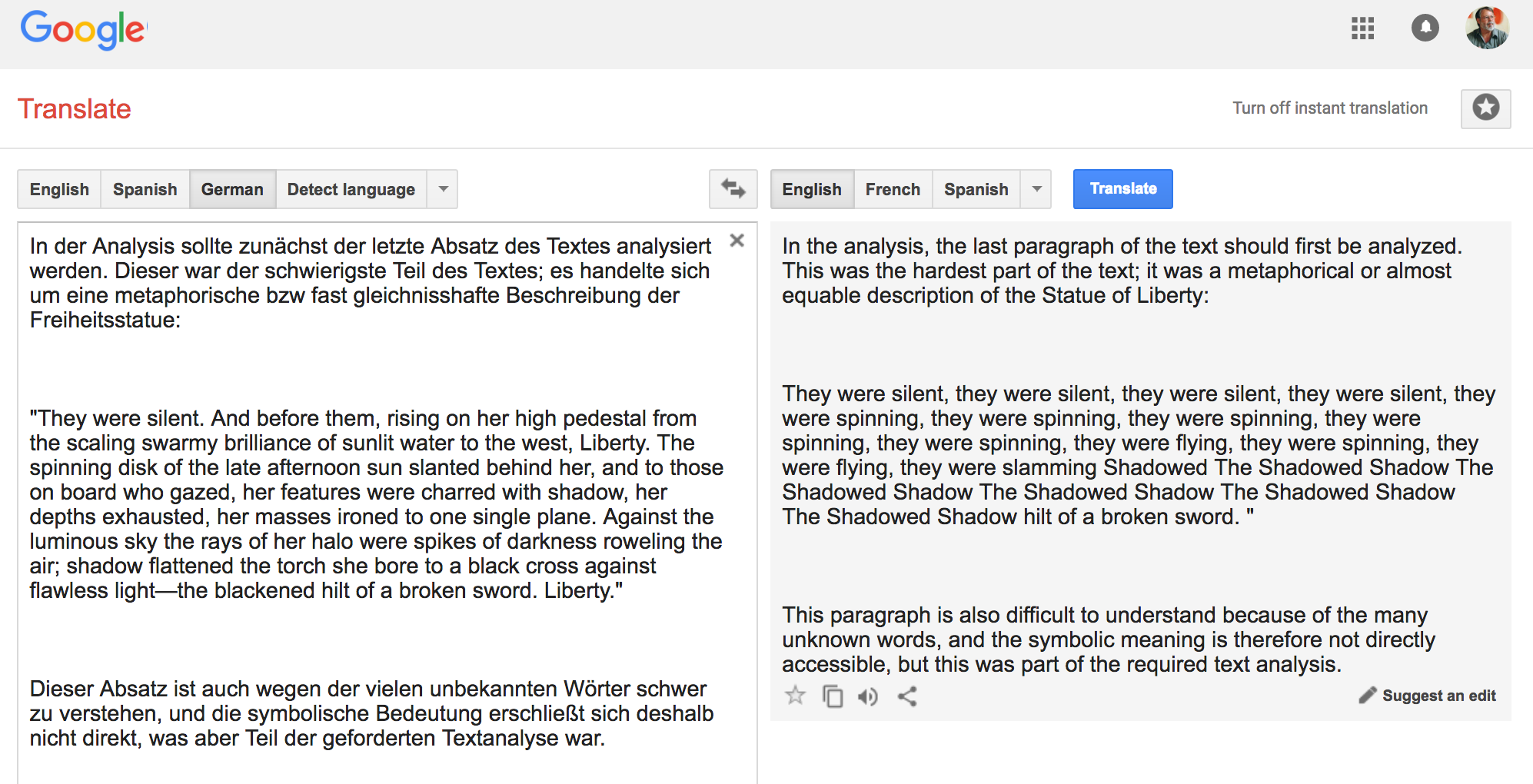Call it what?
« previous post | next post »
Gráinne Ní Aodha, "German students say English exam that asked them to explain Brexit was unfair", The Journal (Dublin) 5/4/2018:
German students have complained that an English exam that asked them to discuss Brexit, among other things, was too difficult and “unfair”.
Over 35,000 people have signed an online petition to voice their opposition to the challenging English paper, saying that the reading comprehensions and current affairs topics were unfair.
Christopher Schuetze, "Thousands of German Students Protest ‘Unfair’ English Exam", NYT 5/5/2018:
Complaining that your final school exams are too tough is a rite of passage — almost a tradition.
But German students in the southwestern state of Baden-Württemberg who hunkered down in April to take pivotal final secondary-school exams have gone a step further in their protests about the English-language portion of the test, which they said was absurd, with obscure and outdated references.
More coverage e.g. here.
The issue for us here at LLOG is the complaint about the reading comprehension material. The Journal cites a passage that certainly does seem to pose some comprehension difficulties, though it seems just about as problematic for a native speaker, at least out of context:
Students complained that the text “Call It Sleep” by Henry Roth was from 1934 and contained archaic language; and an overly obscure description of the Statue of Liberty:
They were silent, they were silent, they were silent, they were silent, they were spinning, they were spinning, they were spinning, they were spinning, they were spinning, they were flying, they were spinning, they were flying, they were slamming Shadowed The Shadowed Shadow The Shadowed Shadow The Shadowed Shadow The Shadowed Shadow The Shadowed Shadow hilt of a broken sword.
The NYT cites a somewhat more coherent passage:
One focus of their objections was a reading comprehension section that used text from “Call It Sleep,” a critically acclaimed 1934 novel by the American writer Henry Roth, which the students said was rife with archaic vocabulary. Their petition highlighted this passage as difficult to comprehend:
“Against the luminous sky the rays of her halo were spikes of darkness roweling the air; shadow flattened the torch she bore to a black cross against flawless light — the blackened hilt of a broken sword. Liberty.”
Those words are not lyrics from a song by a heavy metal band like Black Sabbath, but a reference to the Statue of Liberty.
Oddly, the passage cited by The Journal does not actually exist in Roth's novel, as far as I can tell. A screen shot from The Journal showing that I didn't hallucinate it:

Here's a larger context, from the actual novel, for the NYT version of the allegedly problematic passage:
They were silent. On the dock below, the brown hawsers had been slipped over the mooring posts, and the men on the lower deck now dragged them dripping from the water. Bells clanged. The ship throbbed. Startled by the hoarse bellow of her whistle, the gulls wheeling before her prow rose with slight creaking cry from the green water, and as she churned away from the stone quay skimmed across her path on indolent, scimitar wing. Behind the ship the white wake that stretched to Ellis Island grew longer, raveling wanly into melon-green. On one side curved the low drab Jersey coast-line, the spars and masts on the waterfront fringing the sky; on the other side was Brooklyn, flat, water-towered; the horns of the harbor. And before them, rising on her high pedestal from the scaling swarmy brilliance of sunlit water to the west, Liberty. The spinning disk of the late afternoon sun slanted behind her, and to those on board who gazed, her features were charred with shadow, her depths exhausted, her masses ironed to one single plane. Against the luminous sky the rays of her halo were spikes of darkness roweling the air; shadow flattened the torch she bore to a black cross against flawless light— the blackened hilt of a broken sword. Liberty. The child and his mother stared again at the massive figure in wonder.
There are some quasi-neologisms, like "swarmy" and "roweling", but by and large this passage doesn't strike me as especially difficult to understand. (Although the 38-word sequence cited in the NYT story is unnecessarily obscure presented in isolation, for reasons that have little to do with knowledge of English — it would have been more realistic, as well as more fair, to give the examinees more context. And I don't know what comprehension questions the exam posed — asking for an explication of "roweling" would certainly be unfair.)
This leaves open the question of how Gráinne Ní Aodha (or some editor) came up with that interesting silent spinning flying slamming shadowed shadow of an imaginary passage, which I guess was probably a placeholder for the actual exam section that they didn't have at the time the article was composed. Do journalists often indulge their improvisatory fancies that way, as opposed to just inserting something like [Quotation TK]?
Update — D.O. solved the puzzle. It wasn't a placeholder — it was Google Translate's bizarre response to finding a quoted English passage in the middle of the German petition! So I've added Elephant Semifics to this post's category list.
I should have recognized the style :-). No one else writes quite like that, except maybe Gertrude Stein after an excess of absinthe…
Here's a screenshot of the relevant bit of the original:
And the Google Translate rendition of the page:
We can get the same result by putting just those three paragraphs into Google Translate:
Yet another reminder that "All problems are not solved" …
And just to show that Google Translate's response is not due to any special properties of the petition text, here I've substituted a random German news paragraph for the first part, and left out the third part:
And we get the same result leaving out all the German entirely…
And of course we need Google Translate's performance of its composition:




Evan Harper said,
May 5, 2018 @ 5:29 pm
I genuinely don't know what kind of standard of English competency is expected of German twelfth graders but it strikes me there are a lot of obscure words in there that even many native speakers would struggle to define. Hell I'm not even totally sure what a hawser is (I assume it's a rope for tying up ships to port but that's really just a guess from having seen it in context.)
I guess I'd like to know what specifically they were asked about the passage, and how their answers were graded.
Rebecca Root said,
May 5, 2018 @ 6:19 pm
Depending on the questions and what was covered in the course, it does strike me as obscure to the point that it might not be useful in judging English proficiency.
I can imagine sitting in my college German course (I didn't take it in high school) and not picking up on the fact that a description that seems like it might be talking about an unnamed person is actually talking about an unnamed German statue. I imagine your typical German teen is more familiar with the statue of liberty than I was with various famous German statues, but I can still imagine a kid getting scored low for English proficiency when they really just were not up on this aspect of American culture.
D.O. said,
May 5, 2018 @ 6:58 pm
OK. I have read the petition, not in German, my reading comprehension of that language would not allow me to pass an Abi, but that was a blessing, because now I have an idea of who is the culprit in mangling the Roth's prose. Say it with me Gooooooooooogle. The petition, as translated by the internal Chrome translator contains a quote from Henry Roth, which, of course, was left in the petition in its original incomprehensible English form. But the translator didn't recognize it and tried to translate English text as if it were German into English. With the result reproduced in the OP.
In all fun that this blog had with GT, I don't think anyone (I stopped reading the GT hallucination posts after the third installment and can be wrong there) tried to post an English text in GT and request to translate it into English under the assumption that the original is in some other language.
Apart from that, two places in the complaint obliquely refer to the possibility to use a dictionary.
January First-of-May said,
May 5, 2018 @ 10:44 pm
…wow.
I've regularly used GT services to figure out texts in unfamiliar languages (often German); every so often the texts had English passages inside them.
However, so far, most of the English came through untouched, and the few snippets that did get "translated" still were not mangled so extremely thoroughly.
AntC said,
May 6, 2018 @ 12:14 am
an English exam that asked them to discuss Brexit,
As others have noted, we don't know exactly what the questions were, but since the British Parliament and Government seems incapable of discussing Brexit coherently; and the British public think it something between a joke and a yawn, I agree it's grossly unfair to impose discussion on other countries, in any language.
Yes, as soon as I saw that alleged Roth text, I thought: Google Translate/Elephant semifics..
Joe in Australia said,
May 6, 2018 @ 1:02 am
You can hardly call "roweling" a neologism; it's uncommon today and mostly encountered in its figurative sense (to goad, to anger, as when pricked by a rowel), but in context it's being used almost literally: the spikes of Liberty's crown seemed to pierce the sky in the manner of a rowel against a horse's flank.
Daniel Barkalow said,
May 6, 2018 @ 1:23 am
For some reason, it took me several tries to read that headline without assuming "Brexit was unfair" was a constituent in it and "explain Brexit" couldn't possibly be.
ktschwarz said,
May 6, 2018 @ 1:36 am
GT's problem is caused by the quotation marks around the English passage. If you delete them, the passage goes through unchanged, since it correctly recognizes that it's not German. Quotation marks seem to mess with its ability to break the input into individual sentences. If the neural net is given something that isn't a sentence, the result is a lot less reliable.
@D.O. : See this post from 2014 for some comments and links experimenting with telling GT the input language is something different from what it really is. But those specific quirks are almost all long gone.
I'd love to see updates on past "Elephant semifics" entries. For example, Country list translation oddity is no longer weird with English-to-Spanish, but still goes nuts with English-to-Russian.
Chas Belov said,
May 6, 2018 @ 3:24 am
Interesting. I wasn't getting Google Translate's munging of the English version that you reported. It turns out the munging only happens if the English is enclosed in quotes. No quotes, no munging.
I also got entertaining results for Italian:
Michael Watts said,
May 6, 2018 @ 3:54 am
My workplace uses templated documents in which blanks to be filled in are represented as [TKTK]. To me, this is totally opaque — what is TK supposed to stand for?
[(myl) "To Come". See "Hed, dek, lede, graf, tk: Live with it", 4/8/2007. Or Wikipedia.]
Hans Adler said,
May 6, 2018 @ 4:14 am
In programming, "TK" often abbreviates "toolkit". But in this case I think "token" is a better candidate.
David Marjanović said,
May 6, 2018 @ 6:15 am
"Equable" is an error perhaps caused by the misspelling of gleichnishaft "like a (usually Biblical) parable". The rest of the translation is fine.
Tom Dawkes said,
May 6, 2018 @ 7:53 am
I remember being in an English poetry evening class in the mid-70s. The group included two German students of 18 or 19, I think, who seemed to enjoy the class and to have no difficulty in following. Towards the end of one session, our tutor, an outstanding person in his concern for teaching, gave us an unseen piece and asked us to comment and if possible identify the period and the author. The two Germans , without much hesitation, thought it was 20th century poetry: it was actually a Shakespeare sonnet. I have never forgotten this lesson in how difficult it is for a learner to achieve the native speaker's innate sense of language — or, as the Germans say, Sprachgefühl.
ktschwarz said,
May 6, 2018 @ 2:04 pm
Google Translate has a competitor, DeepL. It's only capable of seven European languages — English, Spanish, French, German, Dutch, Italian, and Polish — but for those languages, it's a strong challenger. I gave it the German petition, including the English passages in quotation marks, and it handled it perfectly, with the English left unchanged (up to a word limit; it won't do the whole thing at once). Also, if you give it the Statue of Liberty passage by itself and tell it to translate German to English, it won't try, but instead translates the English into German. I'd say DeepL wins this one.
Exercises for the reader:
1. Show by experiment that DeepL translations all go through English, just as Google's do. That is, if you ask for Italian to Dutch, internally it's doing Italian to English to Dutch. This can easily be demonstrated using English homonyms.
2. Get some hallucinations out of DeepL. The most effective way is to put in randomized shredded bits of real words, such as "ta ing ed ing er so or er er ing her ing th" from English to something else.
Bloix said,
May 6, 2018 @ 2:33 pm
There are only two difficult words in this passage: roweling. which as Joe from Australia points out is a metaphorical reference to spurs, and swarmy, which is a metaphorical reference to bees – the reflected evening sun on the rippling water seems to break into scales and to swarm, as bees swarm. This is not a neologism, although I suppose it's a technical term used mostly by bee-keepers and entomologists. Other than those two -"hawser" did not appear in the example in the text – what words are difficult? Luminous? Hilt?
The reason the passage is difficult has nothing to do with vocabulary. It's an example of the modernist technique of defamiliarization: the statue is presented through a strange and un-recognizable series of metaphors. As the ever-useful Wikipedia explains:
The term "defamiliarization" was first coined in 1917 by Viktor Shklovsky in his essay "Art as Device"…
The purpose of art is to impart the sensation of things as they are perceived and not as they are known. The technique of art is to make objects ‘unfamiliar,' to make forms difficult, to increase the difficulty and length of perception… A work is created "artistically" so that its perception is impeded and the greatest possible effect is produced through the slowness of the perception."
Roth here is consciously adopting a technique that slows the reader and requires focused concentration. The words are not particularly difficult and (unlike, say, Joyce) every sentence is grammatically correct and there is no skipping or shifting consciousness. But still the difficulty is far above average. Probably not the best source of a passage for a reading comprehension exam.
Anselm said,
May 6, 2018 @ 4:07 pm
Two points are probably worth noting with regard to the English exam in question:
– The papers are still being marked, so whether the students actually have anything to complain about is, at this point, anyone's guess. The English teachers have a certain amount of leeway when grading the results, and the text in question only comprised a fairly small part of the whole exam.
– Students get to use a dictionary during the exam, and that should help with unfamiliar vocabulary.
Bloix said,
May 6, 2018 @ 6:27 pm
PS- Shklyovsky tells us that defamiliarization is a poetic technique, and there isn't any doubt that Roth is writing prose poetry here.
This is Gerard Manley Hopkins, writing about a falcon:
High there, how he rung upon the rein of a wimpling wing
In his ecstasy! then off, off forth on swing,
And this is Roth, writing about a very different kind of bird with a very different emotional impact, and yet a similar poetic technique in describing the bird's flight:
the gulls wheeling before her prow rose with slight creaking cry from the green water, and as she churned away from the stone quay skimmed across her path on indolent, scimitar wing.
Would it be too much to ask a German high school student of English to read The Windhover? Maybe so. But Hopkins is certainly more difficult than Roth.
AG said,
May 6, 2018 @ 11:55 pm
Random connection – Kafka's "Amerika" features a Statue of Liberty holding a sword. That one detail always conjured up an interesting parallel universe for me.
maidhc said,
May 9, 2018 @ 2:09 am
It's usually very misleading for people who know the subject area but know nothing about what was taught in the course to criticize an exam.
The exam contains unusual words. But were students taught how to use a dictionary to deal with unusual words? The exam discusses Brexit. Did the students previously deal with material discussing Brexit in class?
Exam questions are often tailored to the material used in the class, so people who don't know what the course content is are not really equipped to discuss the exam questions.
Another point–if the grades are curved, it might be a valid strategy to give students a challenging assignment to see how student results are distributed. For an easy exam, maybe 20% of the students would get a perfect score. Make the exam harder, and no one gets a perfect score, but you can distinguish the students in the 90-100% range from the students in the 80-90% range.
I know nothing about this particular exam. I'm just speaking in general.
mg said,
May 9, 2018 @ 12:04 pm
@maidhc – your points would be salient if it were a classroom exam. Given that "thousands of students" protested, one can assume it was a standardized test (like the equivalent of an AP exam, perhaps), in which case it is unlikely that every student's classroom had discussed Brexit unless it was mandated for that year's curriculum across the country.
ktschwarz said,
May 11, 2018 @ 10:19 am
Thanks, Bloix, for that excellent literary analysis. Just as a small nitpick, not every sentence is grammatically correct: "And before them, … Liberty" is a sentence fragment. If I were teaching this, I might ask the students why they thought Roth chose to write that instead of "And before them, … was Liberty" — but I'd ask in a class discussion or take-home essay, not a timed exam.